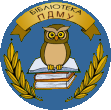 |  |

|
|

|
||||||||||||||||||
| ПОЛТАВСЬКИЙ ДЕРЖАВНИЙ МЕДИЧНИЙ УНІВЕРСИТЕТ | ||||||||||||||||||||
Бази даних |
|
Вид пошуку |
||||||||||||||||||
|
||||||||||||||||||||
електронних бібліотек і нових інформаційних технологій (Асоціація ЕБНІТ) |
||||||||||||||||||||